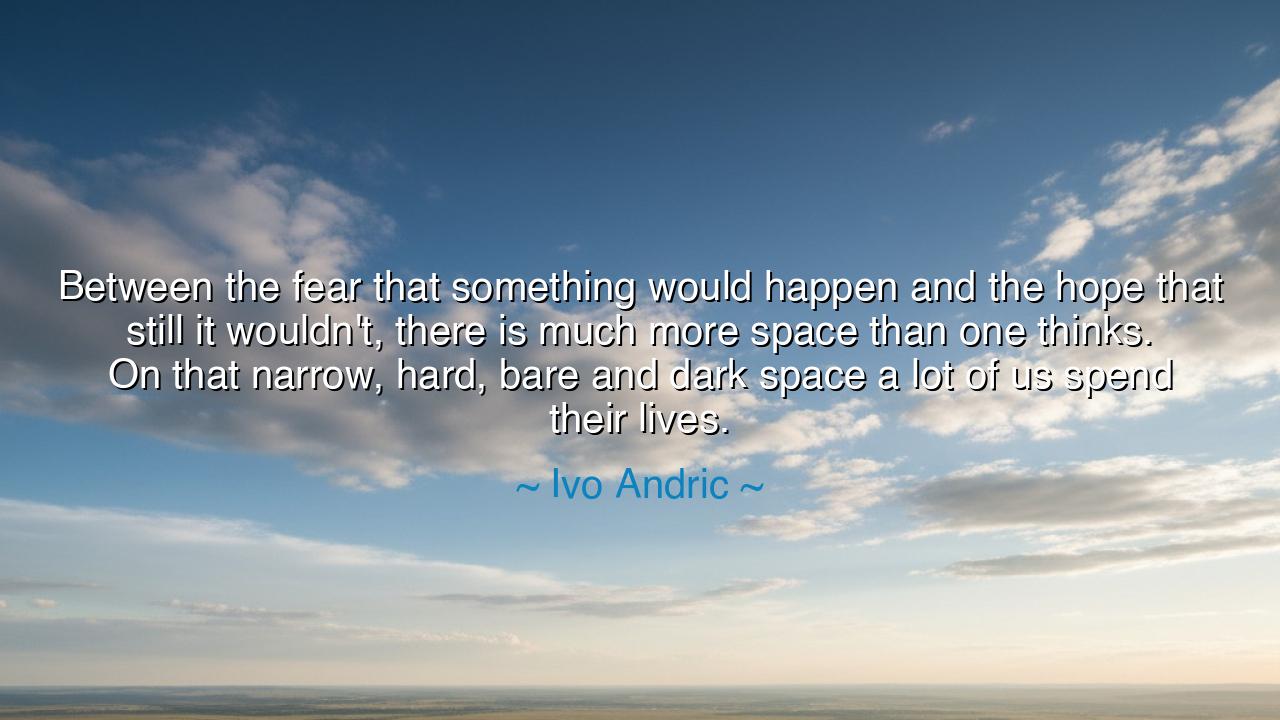
Between the fear that something would happen and the hope that
Between the fear that something would happen and the hope that still it wouldn't, there is much more space than one thinks. On that narrow, hard, bare and dark space a lot of us spend their lives.






“Between the fear that something would happen and the hope that still it wouldn’t, there is much more space than one thinks. On that narrow, hard, bare and dark space a lot of us spend their lives.” — thus wrote Ivo Andrić, the Bosnian sage and Nobel laureate, whose words move like slow rivers through the valleys of the human soul. In this reflection, Andrić reveals the silent tragedy of existence — that much of human life is not lived in the fullness of joy nor in the completeness of sorrow, but in the liminal space between fear and hope. It is there, in that uncertain terrain where the heart trembles and the mind circles endlessly around what might be, that countless souls dwell, unable to step forward, unable to retreat.
The origin of this thought arises from Andrić’s deep understanding of human nature, forged in a land scarred by history — the Balkans, where empires collided, and generations lived beneath the shadow of war and loss. His words, though shaped by his homeland’s struggles, speak to a universal human condition: the condition of waiting. Between fear, which paralyzes, and hope, which sustains, lies a fragile balance where the soul neither lives fully nor dies completely. This “narrow, hard, bare and dark space” is not a place of drama, but of quiet endurance — where men and women carry the burden of uncertainty, afraid to dream, yet unable to despair.
Andrić’s imagery calls to mind the ancient philosophers who saw life itself as a bridge between opposites. The Stoics taught that peace can only be found in accepting both fortune and misfortune as part of the same divine order. Yet most of us, like Andrić’s travelers of the spirit, linger not in acceptance but in tension — clutching our hopes so tightly that they turn into fear. We fear loss when we have love; we fear failure when we have ambition; we fear time when we still possess life. Thus, our existence becomes a long vigil between two shadows — what we dread and what we desire — and that vigil, he reminds us, becomes our life itself.
Consider, for example, the story of Anna Akhmatova, the Russian poet who stood outside the prison walls of Leningrad for years, waiting for news of her imprisoned son during Stalin’s reign. Every day she lived “between fear and hope” — fear that her child was dead, hope that he might still live. That narrow space, that long corridor of anguish and prayer, became her home. She wrote not of victory, but of endurance, and through her endurance, she became the voice of a generation. Like Andrić’s vision, her life revealed that even in darkness, the act of waiting — of holding both fear and hope together — is a form of sacred strength.
Andrić’s insight also serves as a mirror to modern man, who, though surrounded by noise and motion, still lives in that invisible tension. We wait for the verdicts of our choices, for the outcomes of love, for the approach of death. Our days are filled with anxious prayers that what we dread will not come to pass, and yet we sense that it might. The ancients called this the agony of anticipation — the suffering not of the event itself, but of the mind’s endless imagining of it. To dwell too long in that space is to lose the present moment, to waste one’s strength in battling ghosts.
But Andrić does not speak only to despair. Hidden within his melancholy truth is a quiet path toward wisdom. For if we recognize this “narrow space” as part of the human condition, we may learn to walk it with grace instead of torment. The wise, like the old monks and philosophers, learn to make peace with uncertainty — to live within it, not against it. They understand that fear and hope are not enemies but twins, born of the same longing for control in a world that cannot be controlled. To live well, then, is to loosen one’s grip on both, and to find freedom not in certainty, but in acceptance.
Therefore, O listener of tomorrow, take this teaching to heart: life will always unfold between fear and hope. Do not curse the space between them, for it is where your courage is forged. When fear comes, let it humble you; when hope arises, let it lift you — but let neither rule you. Work, love, and walk forward, even in the dark, for motion itself is defiance. And remember, as Ivo Andrić knew, that most lives are lived in the silence between two storms — but even there, the soul may burn with quiet light. It is not the absence of fear nor the fulfillment of hope that defines us, but how we endure the space between them — that narrow, hard, bare, and dark space where the human spirit learns what it means to be alive.






AAdministratorAdministrator
Welcome, honored guests. Please leave a comment, we will respond soon